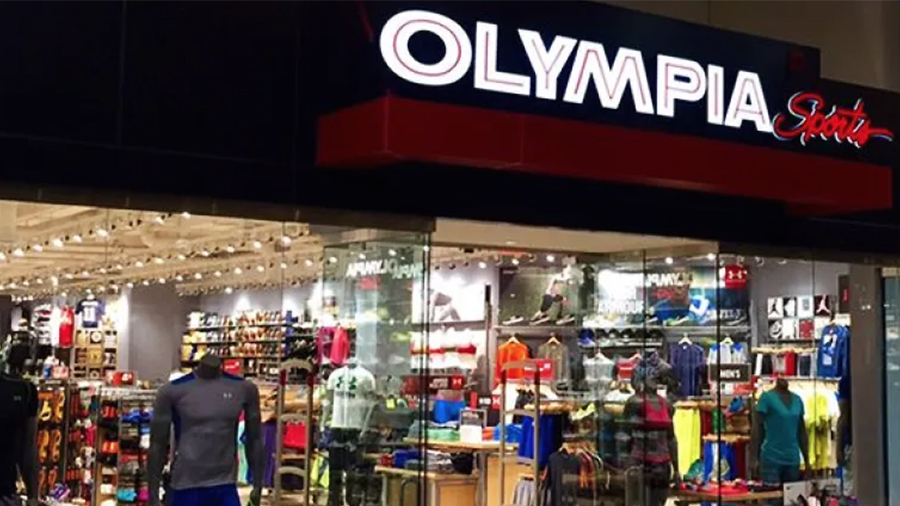<span style="color: #737373;">In an affidavit, as part of the bankruptcy court filing of Olympia Sports Acquisitions, Mark Coffey, CEO since March 2022, attributed the filing to sales challenges brought on by the pandemic, a failed software contract and a restrictive loan agreement.
In July, the Auburn, ME-based retailer confirmed that it would shutter its remaining 35 retail stores by the end of September, and a going-out-of-business (GOB) sale at all its doors would begin at the time.
In the affidavit, Coffey wrote that the bankruptcy filing was necessary for “maintaining the confidence and support of their key customer and employee constituencies during the GOB sales process and subsequent wind-down of remaining operations.”
In the affidavit, Coffey, a 14-year Olympia Sports veteran, appointed as CEO in March 2022 and was previously chief information officer, noted that Olympia was founded in 1975 by Ed Manganello with a focus on serving the sporting goods needs of smaller communities across the Northeast and mid-Atlantic regions.
Beginning with its first store in Portland, ME, Olympia expanded slowly, eventually growing to over 230 locations by 2012. The retail stores ranged from 4,000 square feet, including numerous mall locations, to 15,000 square feet.
From 2013 to 2019, Olympia closed underperforming stores as leases expired.
In October 2019, RSG, also part of the bankruptcy, acquired the intellectual property of 75 stores and the company’s online business. At that time, Olympia had 152 stores, and the 77 stores not acquired were closed.
RSG was formed in 2017 when CriticalPoint, a Manhattan Beach, CA-based venture capital firm, acquired JackRabbit from The Finish Line. At the time of the acquisition, Jackrabbit had 55 stores and a “significant e-commerce presence, said Coffey.
As noted by Coffey, CriticalPoint sought to create a “family of brands” focused on footwear, apparel and accessories with the acquisitions of Olympia Sports in October 2019 and Shoebuy.com in October 2020. Walmart owned Shoebuy.com.
Shoebuy.com’s Struggles
Challenges turning around Shoebuy.com played a significant role in the bankruptcy. Coffey noted in the affidavit that in the year before its acquisition, Shoebuy.com lost approximately $19 million on sales of $131.4 million. Coffey said CriticalPoint believed that Shoebuy.com’s losses resulted from the high expense related to Shoebuy.com’s “homegrown” online platform, which required a large support staff to operate.
CriticalPoint felt Shoebuy.com would become “extremely profitable” with a streamlined and efficient online platform.
According to Coffey, the company retained Salesforce in April 2021 to provide e-commerce support for Shoebuy.com, Olympia and Jackrabbit, with the expectation that the contract would result in over $400 million in gross sales; however, Salesforce’s order management system led to duplicated orders, unprocessed or sent to the wrong recipient. Upon launch, Shoebuy.com’s average gross sales per day decreased from about $360,000 to $224,000.
Coffey wrote, “As a result of the many problems associated with the Salesforce platform, substantial funds were expended by the debtors trying to fix these problems and/or create workarounds for those items that Salesforce was unable to address.”
The significant decline in sales also impacted the availability of funds under its loan agreement at the time with White Oak Global Advisors. White Oak was granted a security interest in all RSG company assets. The availability of funds under the loan was subject to calculations based on eligible inventory and accounts receivable.
Olympia Sports’ Operations Disrupted By Pandemic
At the same time as Shoebuy.com faced challenges implementing a new order management system, the Olympia Sports business was struggling due to the seasonality of its business and the residual effects from the pandemic.
Coffey wrote in the affidavit that Olympia Sports’ business was seasonal and earned much of its income during the holiday and “back-to-school” seasons. Conversely, Olympia consistently struggled through the spring and summer. He shared, “While Olympia was typically able to produce enough revenue to maintain operations until the back-to-school season began in the fall, the COVID-19 outbreak and related stay-at-home and shutdown orders resulted in fewer sales for Olympia in the year prior to the Salesforce contract. Further, the shutdowns caused by COVID-19 aged Olympia’s inventory, meaning that much of Olympia’s inventory was undesirable and difficult to sell.”
While Olympia and Shoebuy.com struggled with the Salesforce platform and the ongoing effects of COVID, Jackrabbit remained largely unaffected and was EBITDA positive during this period, said Coffey. Jackrabbit’s ongoing success allowed RSG Companies to support Olympia’s and Shoebuy.com’s operations and further enabled the RSG Companies to continue to draw on the White Oak loan to support operations. However, Coffey said that despite Jackrabbit’s support, “it became evident that the RSG Companies continued operations were not sustainable given the ongoing challenges with the Salesforce platform and COVID-related issues.”
Jackrabbit’s Sale Process
At this point, RSG Companies’ former executives, led by CEO Bill Kirkendall and CFO Beau Swenson, began exploring a potential sale of Jackrabbit’s assets to Fleet Feet Sports. Coffey added, “In furtherance of the goal of consummating this sale, the former executives opted to focus their efforts and resources on maintaining sales levels at Jackrabbit. This impacted the availability of funds to support Shoebuy.com and Olympia.”
The asset sale of Jackrabbit to Fleet Feet was finalized in December 2021, and Kirkendall and Swenson terminated their relationship with RSG Companies, “leaving new management to deal with the challenges left behind. While Fleet Feet acquired Jackrabbit’s inventory-related liabilities, all other liabilities of Jackrabbit were excluded from the sale,” said Coffey.
Another negative from the sale of Jackrabbit was that RSG Companies started using only 15 percent of the services provided in the Salesforce contract, and renegotiation efforts failed. In January 2022, RSG Companies ceased making payments on the Salesforce contract, and Salesforce charged RSG Companies with a default.
With Shoebuy.com’s sales never rebounding, RSG Companies decided to sell Shoebuy.com’s assets (primarily IP and inventory) to stop the losses associated with its operations and generate funds to pay down the White Oak loan.
Designer Brands, Inc., the parent of DSW, acquired Shoebuy.com. However, similar to the Jackrabbit sale, RSG was left with Shoebuy.com’s liabilities as part of the sale.
In April, RSG Companies engaged Force Ten Partners, LLC, an advisory firm specializing in business restructuring and sourcing buyers for distressed businesses, and moved to close 22 of Olympia Sports’ remaining 63 stores to generate cash flow to continue to run operations.
In July, Olympia opted to liquidate all remaining stores and ceased buying product and inventory. Since engaging SB360, Olympia Sports has, through liquidation, recovered approximately 110 percent of the cost of goods sold. The stores’ liquidation is expected to be completed by the end of September 2022.
Coffey concluded, “I believe that it is imperative that Olympia be able to continue the GOB sales Process post-petition. As noted, Olympia plans to continue liquidating its stores before proposing a plan of liquidation in this case. Continuing with the GOB Sales Process without interruption will offer the estates the best chance of maximizing returns to creditors.”
The affidavit noted that Olympia currently has 324 employees.
In 2020, Olympia’s revenues were approximately $50 million, with earnings before interest, taxes, depreciation, and amortization (EBITDA) of around negative $10 million.
In 2021, Olympia’s revenues were approximately $74 million, with an EBITDA of around negative $1.5 million. In 2022, through July 31, revenues were roughly $28 million with an EBITDA of approximately negative $7.8 million.
The filing noted that Olympia ceased its e-commerce operations in April 2022. Olympia only launched e-commerce sales in 2018 but was never able to turn a profit online due to the cost of shipping, the extent of the competition in the e-commerce space and other factors.
















